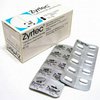Some medical conditions may interact with Aristocort. Tell your doctor or pharmacist if you have any medical conditions, especially if any of the following apply to you:
- if you are pregnant, planning to become pregnant, or are breast-feeding
- if you are taking any prescription or nonprescription medicine, herbal preparation, or dietary supplement
- if you have allergies to medicines, foods, or other substances
- if you have or have been recently exposed to a bacterial, fungal, parasitic, ameba, or viral infection, especially measles, chickenpox, shingles, tuberculosis (TB), or herpes simplex of the eye
- if you have been recently vaccinated, or have had a positive TB skin test
- if you have heartburn, stomach pain, diarrhea, or intestinal problems (eg, obstructions, perforations, peptic ulcer, recent intestinal surgery)
- if you have a blood coagulation disorder, heart problems, diabetes mellitus, kidney problems, liver disease, an underactive thyroid, unstable joints, or osteoporosis, fractures, or have had a recent heart attack or joint surgery
- you have unstable emotions, depression, or myasthenia gravis (muscle weakness)
Some MEDICINES MAY INTERACT with Aristocort. Tell your health care provider if you are taking any other medicines, especially any of the following:
- Barbiturates (eg, phenobarbital), carbamazepine, hydantoins (eg, phenytoin), or rifampin because they may decrease Aristocort's effectiveness
- Clarithromycin, oral contraceptives (birth control pills), or itraconazole because the risk of side effects, such as nervous system or adrenal gland problems, may be increased
- Aspirin, mifepristone or ritodrine because the risk of their side effects may be increased by Aristocort
This may not be a complete list of all interactions that may occur. Ask your health care provider if Aristocort may interact with other medicines that you take. Check with your health care provider before you start, stop, or change the dose of any medicine.
Tell your doctor or dentist that you take Aristocort before you receive any medical or dental care, emergency care, or surgery.
Do not receive a live vaccine (eg, measles, mumps) while you are taking Aristocort. Talk with your doctor before you receive any vaccine.
Aristocort may lower the ability of your body to fight infection, especially if you use it for a long period of time. Avoid contact with people who have colds or infections. If you are exposed to chickenpox, measles, or TB while you are taking Aristocort or during the 12 months after stopping Aristocort, call your doctor. Tell your doctor if you have an injury or notice signs of infection like fever, sore throat, rash, or chills for up to 12 months after you stop using Aristocort.
Diabetes patients - Aristocort may affect your blood sugar. Check blood sugar levels closely. Ask your doctor before you change the dose of your diabetes medicine.
Lab tests, including body weight, blood sugar and potassium, or chest x-ray, may be performed while you use Aristocort. These tests may be used to monitor your condition or check for side effects. Be sure to keep all doctor and lab appointments.
Corticosteroids may affect growth rate in CHILDREN and teenagers in some cases. They may need regular growth checks while they take Aristocort.
Aristocort should be used with extreme caution in CHILDREN; safety and effectiveness in children have not been confirmed.
PREGNANCY and BREAST-FEEDING: If you become pregnant, contact your doctor. You will need to discuss the benefits and risks of using Aristocort while you are pregnant. It is not known if Aristocort is found in breast milk. Do not breast-feed while taking Aristocort.
If you are on long-term therapy, you may have WITHDRAWAL symptoms (eg, muscle and joint pain, exhaustion, depression) if you suddenly stop taking Aristocort. Do not stop taking Aristocort suddenly or change the dosage without asking your pharmacist or doctor.







